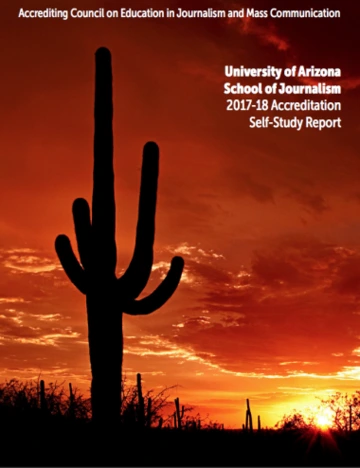National council OKs School of Journalism's re-accreditation
The national Accrediting Council on Education in Journalism and Mass Communications unanimously approved the UA School of Journalism's 2017-18 re-accreditation on April 27 in Chicago, three months after a site team lauded the school for its experienced faculty, tight-knit students, out-of-class opportunities and strong internship program.

The school has been nationally accredited every six years since 1964, but this is the first time in 30 years that it has earned re-accreditation by passing all nine of the key standards of compliance. In 2012 the school failed the assessment standard, but has since focused on measuring student success and passed the standard this year with strong praise from the site team, which visited the school in late January.
About a quarter of all journalism programs are nationally accredited, and of those, about half pass without a failed standard, placing the school in about the top 10 percent of journalism programs in the nation.
“This is a result of hard work by faculty over the past several decades in building and improving the program,” school Director David Cuillier said. “Students and alumni can feel proud to be a part of one of the best journalism programs in the country.”
University of Arizona President Robert C. Robbins lauded the successful re-accreditation report in a Tweet on Jan. 28:
Congratulations to @EllerCollege and @uajschool for their recent reaccreditations and amazing site visits. Bright futures for these two programs – TY to Eller Dean Paulo Goes and School of Journalism Director @DavidCuillier! @UA_SBS
— Robert C. Robbins (@UofAPres) January 28, 2018
Below are some of the significant strengths noted by the national experts in the site team's report:
- A tight-knit, engaged student community. Students are proud of the School’s faculty credentials and the opportunities they have to work with them and one another. A student lounge on the same floor as classrooms and faculty offices is a place where they work together and discuss news of the day. Words like “family” and “community” were used to describe the ethos.
- Experienced faculty who pride themselves on their service to students. All faculty must have significant journalism experience, and they do. The School is sometimes called “New York Times West” because of the number of ex-Times staffers who teach there. Faculty members are devoted to instilling a passion for journalism in their students and to giving them real-world experience.
- Strong leadership. The Director has gained in stature among the School’s faculty over the past few years as he has collaborated with colleagues across campus and successfully lobbied for the School with the dean to gain resources and opportunities for all faculty in his unit. He has raised the profile of the School, has strengthened alumni connections and been a successful fundraiser.
- Strong out-of-classroom opportunities through student clubs and School media. The School has multiple clubs and pays membership fees for students. It also encourages joint programming through a consortium-style club set-up. All students get field experience in reporting through its upper-level, “digital-first” student media courses.
- Assessment with results. The School responded in a manner characterized as an “exemplar” by University administrators after being found out of compliance on assessment in 2012. It has a thorough and detailed plan, the results to prove the plan works, and respect of the university on its dedication to moving aspiration to reality for student learning.
- A strong internship program. A dynamic and popular internship coordinator connects the students with strong opportunities in the region, where the School enjoys a good reputation with employers. Faculty members also connect students with internships. The evaluation of internship experiences for students and employers is systematic and thorough.
The site team included Dr. Marie Hardin of Penn State, Dr. George Daniels of Alabama and Mike Philipps, retired president and CEO of the Scripps Howard Foundation. They visited with students, faculty, staff and UA administrators, including President Robbins, Jan. 22-24.
Download and read the full 2017-2018 Self-Study Accreditation Report (PDF File)

